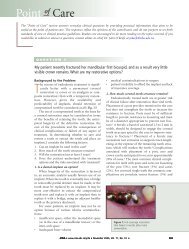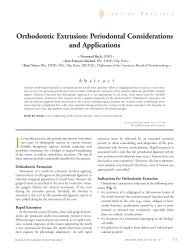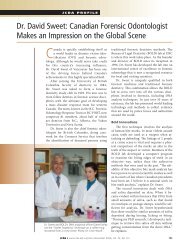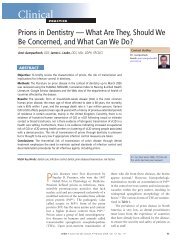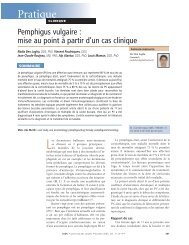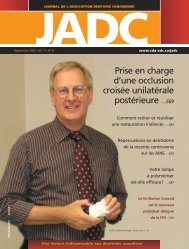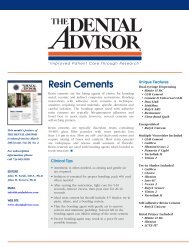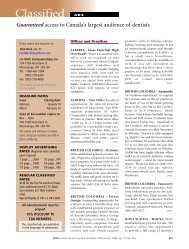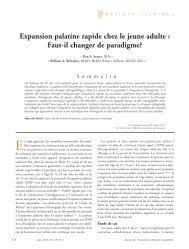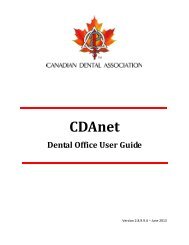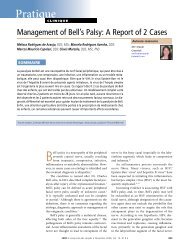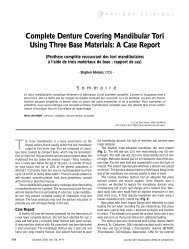JCDA - Canadian Dental Association
JCDA - Canadian Dental Association
JCDA - Canadian Dental Association
Create successful ePaper yourself
Turn your PDF publications into a flip-book with our unique Google optimized e-Paper software.
ecently 2 and I would advise all<br />
to have a close look at this article.<br />
Be careful of jumping on the EBD<br />
bandwagon. While it is a laudable<br />
goal, I have always felt that there are<br />
decades of solid research required in<br />
many fields before we can draw conclusions<br />
based on meta-analyses.<br />
Dr. Mark Antosz<br />
Calgary, Alberta<br />
References<br />
1. Cochrane Review Abstracts. J Can Dent Assoc<br />
2008; 74(4):333–36.<br />
2. Papadopoulos MA, Gkiaouris I. A critical<br />
evaluation of meta-analyses in orthodontics.<br />
Am J Orthod Dentofacial Orthop 2007;<br />
131(5):589–99.<br />
CDA Responds<br />
Thank you for your letter regarding<br />
the Cochrane Review Abstracts<br />
published in <strong>JCDA</strong> and the practise<br />
of evidenced-based dentistry (EBD).<br />
CDA collaborates with the<br />
<strong>Canadian</strong> Cochrane Network and<br />
Centre to reprint abstracts from<br />
selected Cochrane Reviews that<br />
will be of interest to <strong>Canadian</strong><br />
dentists. These reviews have been<br />
prepared by the Cochrane Oral<br />
Health Group within the Cochrane<br />
Collaboration. Systematic reviews<br />
prepared by the Cochrane<br />
Collaboration are considered to be<br />
the highest quality systematic reviews<br />
available due to the protocols<br />
and processes in place. Reviews<br />
prepared and published by other<br />
organizations may not have gone<br />
through such a rigorous and thorough<br />
process.<br />
In a systematic review, evidence<br />
on a topic has been systematically<br />
identified, appraised and summarized<br />
according to predetermined<br />
criteria. Meta-analysis is a statistical<br />
technique that summarizes the results<br />
of several studies into a single<br />
estimate, giving more weight to<br />
results from larger studies. As you<br />
have referenced, meta-analyses can<br />
produce misleading results if done<br />
poorly, hence the need for good<br />
critical appraisal skills.<br />
––– Letters –––<br />
EBD is the integration of the best<br />
available clinical evidence, clinical<br />
judgment and patient values and<br />
circumstances. The introduction<br />
of EBD has had a mixed reception<br />
within the dental community. Some<br />
experienced clinicians rejected this<br />
new approach and criticized the<br />
focus on evidence from randomized<br />
controlled trials (RCTs) and systematic<br />
reviews of RCTs. There is now an<br />
understanding that evidence from<br />
the most appropriate study design is<br />
required to answer the clinical question<br />
being asked. In the absence of<br />
clinical studies, the best available<br />
evidence will be the opinion of experts<br />
— including free thinkers and<br />
innovators.<br />
As policy makers often rely on<br />
the current best available evidence<br />
to make decisions about the care of<br />
individuals or the delivery of health<br />
services, it is important that the<br />
dental profession support the dental<br />
research effort that provides the<br />
sound evidence base for the practise<br />
of dentistry.<br />
Dr. Euan Swan<br />
Manager, <strong>Dental</strong> Programs<br />
<strong>Canadian</strong> <strong>Dental</strong> <strong>Association</strong><br />
Article on Chlorinated Pools<br />
Has Ripple Effect in Thailand<br />
was very interested to read the<br />
I case study on tooth erosion from<br />
swimming in improperly chlorinated<br />
pools. 1<br />
I live in Thailand and have been<br />
swimming at a local pool 2 to 3 times<br />
a week for the last 3 years. Like the<br />
woman in the case study, I always<br />
do front crawl and it is impossible<br />
not to get water in your mouth when<br />
you breathe. I have always noticed<br />
that my teeth felt “on edge” after<br />
being in the pool, but never thought<br />
anything more of it until recently<br />
when, very rapidly, my teeth became<br />
super sensitive and I noticed an obvious<br />
discolouration. I was amazed<br />
at how quickly they deteriorated<br />
after that. I guess that with the<br />
eroded enamel there is less protec-<br />
574 <strong>JCDA</strong> • www.cda-adc.ca/jcda • September 2008, Vol. 74, No. 7 •<br />
tion and the erosion rate escalates.<br />
I am 32 years old with no previous<br />
fillings or dental work, but now I am<br />
going to need veneers or some other<br />
treatment.<br />
The pool that I (used to) go to is<br />
also used for offshore safety training<br />
where helicopters drop down life<br />
rafts for trainees wearing boiler<br />
suits. When I complained about<br />
the chlorine levels at the pool, the<br />
staff openly admitted to using more<br />
than the recommended levels (and<br />
obviously not enough alkali to balance<br />
the pH) due to the pool’s heavy<br />
usage. Incidentally, they use stabilized<br />
chlorine as opposed to chlorine<br />
gas.<br />
I will be dropping off a copy of<br />
the article to the pool staff because I<br />
don’t want others to suffer the same<br />
dental problems I have experienced.<br />
Hopefully this will result in some<br />
corrective action.<br />
I thought your readers might be<br />
interested to hear of another case<br />
and know that the article is helping<br />
by raising awareness.<br />
Mr. David Brent<br />
Thailand<br />
Reference<br />
1. Dawes C, Boroditsky CL. Rapid and severe<br />
tooth erosion from swimming in an improperly<br />
chlorinated pool: case report. J Can Dent Assoc<br />
2008; 74(4):359–61.<br />
One of the Authors Responds<br />
was surprised but pleased to<br />
I learn that our article was read in<br />
a country as far from Canada as<br />
Thailand.<br />
Our aim in writing the case report<br />
was to alert dental practitioners<br />
to the fact that improperly chlorinated<br />
swimming pools may be a<br />
danger to the teeth of their patients.<br />
It is a great credit to <strong>JCDA</strong> that it<br />
makes its content freely available<br />
on the Internet, which allowed Mr.<br />
Brent to determine the cause of his<br />
own dental erosion problem.<br />
More recent correspondence<br />
with Mr. Brent suggests that the<br />
Continued on page 576



